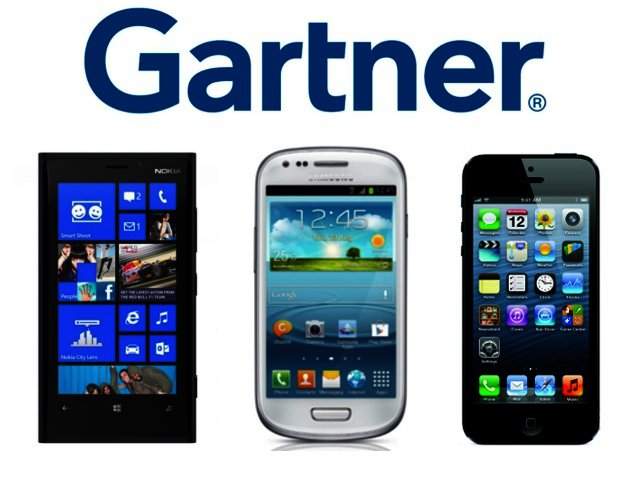Global mobile phone sales drops 1.7 percent in 2012 - Gartner
By Hanleigh Daniels 14 February 2013 | Categories: news
Worldwide mobile phone sales to end users totaled 1.75 billion units in 2012, a 1.7% decline from 2011 sales, according to market research company Gartner. Smartphones continued to drive overall mobile phone sales, and Q4 2012 saw record smartphone sales of 207.7 million units, up 38.3% from the same period last year.
Anshul Gupta, principal research analyst at Gartner stated that it was in 2009 that the global mobile phone market last experienced a decline. Gupta added that the most recent decline was brought about by tough economic conditions, shifting consumer preference towards smartphones and intense market competition, which all joined forces to weaken the worldwide mobile phone market this year.
Demand for feature phones remained weak in 2012 and during Q4 2012, with feature phone sales totaling 264.4 million units to represents a 19.3% year-on-year decline. Gartner expects feature phones sales to continue dropping this year. The analytics company predicts that sales of worldwide smartphone sales to end users will be close to 1 billion units in 2013, whilst overall mobile phone sales are estimated to reach 1.9 billion units.
Apple and Samsung run the smartphone show
In Q4 2012, Apple and Samsung increased their cumultive global smartphone market share to 52%, up from 46.4% during Q3 2012. Samsung had a glittering 2012, capping the year as the number one selling smartphone and mobile phone maker.
Gupta stated that there is not an original equipment manufacturer (OEM) that can firmly lay claim to the third place in global smartphone sales, since the success of both Apple and Samsung is based not only on the products these companies release but also on the strength of their brands.
He explained that Cupertino and Samsung’s rivals including those with comparable mobile products, struggle to achieve the same brand appreciation amongst consumers. Clients may opt for a more affordable product (rather than an iPhone or Galaxy-branded smartphone) during the tough economic climate, but they only opt for the cheaper product because it costs less and not because they consciously went for a different brand.
In Q4, Samsung’s overall smartphone sales continued to climb reaching 64.5 million units, up 85.3% from Q4 2011. A whopping 53.5% of the Korean tech giant’s 384.6 million mobile phone sales for the year were smartphone sales.
Gartner asserts that Samsung’s resources, coupled with its ability to build a broad market reach is an advantage that no other competitor can easily match, but the research company added that competition will be intensifying during 2013 as rivals the likes of Sony and Nokia improve.
“With Samsung commanding over 42.5% of the Android market globally, and the next vendor at just 6% share, the Android brand is being overshadowed by Samsung’s brand, with the Galaxy name nearly a synonym for Android phones in consumers’ mind share,” said Gupta.
Apple’s sales reached 43.5 million units during Q4 2012, up 22.6% year-on-year. For the whole year Cupertino’s sales totaled 130 million smartphone sales worldwide. While the demand for iPhones in Q4 2012 remained strong, many buyers opted for the less expensive iPhone 4 (review) and 4S (review) models over the new iPhone 5 (review).

Table: Gartner
The rise of China’s Huawei and decline of Espoo
Huawei had a great final quarter of 2012, which assisted the Chinese company in reaching the number 3 position amongst smartphone vendors for the first time. Within last year, Huawei sold 27.2 million smartphones to end users, up 73.8% from 2011’s figure.
Gartner analysts believe that international markets will be key for Huawei’s growth during 2013, as will the company’s ability to improve its product range with a few top tier devices.
In Q4 2012, Finnish phone giant Nokia’s handset sales improved, on the back of strong Asha mobile phone sales and the launch of the latest Windows Phone 8 running Lumia models. According to Gartner, this sales boost, however, was not sufficient to stop Espoo’s market share dipping by a sizable 18%, to its lowest levels yet.
During 2012, Nokia reached 39.3 million smartphone sales worldwide, down 53.6% from 2011. Analysts said that aside from its continued focus on Lumia, Nokia needs to build on momentum around its affordable Asha line this year, by adding devices as well as apps to further augment its overall value proposition. In doing so, the Finnish company will also be able to move the price point of these mobile phones slightly higher in order to achieve better margins and breach the gap left by Symbian.
Mobile platform market
In the smartphone operating system (OS) market, Android captured more than 50% of the OS market to widen the gap between itself and iOS. While Android grew 87.8% during Q4 2012, BlackBerry OS declined by 44.4% in the same period. Microsoft had a better end of year quarter, with its share growing 1.2 percentage points, and its smartphone sales increasing 124.2% year-on-year.

Table: Gartner
“2013 will be the year of the rise of the third ecosystem as the battle between the new BlackBerry 10 and Windows Phone intensifies,” said Gupta. “As carriers and vendors feel the pressure of the strong Android’s growth, alternative operating systems such as Tizen, Firefox, Ubuntu and Jolla will try and carve out an opportunity by positioning themselves as profitable alternatives.”
In related news, Gartner also recently delivered its take on the state of global PC shipments during the last quarter of 2012, which totaled 90.3 million units that represents a 4.9% decline compared to Q4 2011.
Most Read Articles

Have Your Say
What new tech or developments are you most anticipating this year?



